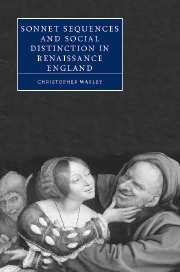Book contents
- Frontmatter
- Contents
- Preface
- 1 Sonnet sequences and social distinction
- 2 Post-romantic lyric: class and the critical apparatus of sonnet conventions
- 3 “An Englishe box”: Calvinism and commodities in Anne Lok's A Meditation of a Penitent Sinner
- 4 “Nobler desires” and Sidney's Astrophil and Stella
- 5 “So plenty makes me poore”: Ireland, capitalism, and class in Spenser's Amoretti and Epithalamion
- 6 “Till my bad angel fire my good one out”: engendering economic expertise in Shakespeare's Sonnets
- 7 “The English straine”: absolutism, class, and Drayton's Ideas, 1594–1619
- Afterword: Engendering class: Drayton, Wroth, Milton, and the genesis of the public sphere
- Notes
- Index
- Cambridge Studies in Renaissance Literature and Culture
4 - “Nobler desires” and Sidney's Astrophil and Stella
Published online by Cambridge University Press: 22 September 2009
- Frontmatter
- Contents
- Preface
- 1 Sonnet sequences and social distinction
- 2 Post-romantic lyric: class and the critical apparatus of sonnet conventions
- 3 “An Englishe box”: Calvinism and commodities in Anne Lok's A Meditation of a Penitent Sinner
- 4 “Nobler desires” and Sidney's Astrophil and Stella
- 5 “So plenty makes me poore”: Ireland, capitalism, and class in Spenser's Amoretti and Epithalamion
- 6 “Till my bad angel fire my good one out”: engendering economic expertise in Shakespeare's Sonnets
- 7 “The English straine”: absolutism, class, and Drayton's Ideas, 1594–1619
- Afterword: Engendering class: Drayton, Wroth, Milton, and the genesis of the public sphere
- Notes
- Index
- Cambridge Studies in Renaissance Literature and Culture
Summary
Anne Lok's impact on subsequent writers of sonnets probably ranged from minimal to non-existent. Though there is some evidence that the Countess of Pembroke, if not Philip Sidney, encountered her and perhaps her work, Lok's importance lies not in any explicit influence but rather in the capacity of her work to make apparent other forces that have been largely neglected in the study of sonnets. These possibilities are especially apparent in the most influential sonnet sequence of the era, Sidney's Astrophil and Stella. As I argued in chapter two, Sidney was understood throughout much of the nineteenth century as either a dull conventional sonneteer or a passionate noble lover. Through the twentieth century Sidney became known as the great inheritor of Wyatt and Surrey, the writer of the first “authentically Petrarchan Petrarchism” in England, and a proponent of the poetic taste that dominated continental courts. Since the 1960s, critics have stressed these courtly connections by arguing that the sonnet was a dominant form at court, employed by political insiders like Wyatt and Surrey, and written under Queen Elizabeth by Gascoigne, Watson, and above all, Sidney. Out of this narrative, Sidney emerges as the paradigmatic “courtier poet”; his use of Petrarchan conventions in Astrophil and Stella documents the dynamics of Elizabethan court life, and, for new historicist readings in particular, the frustrations and limitations of the ambitious Elizabethan courtier.
- Type
- Chapter
- Information
- Publisher: Cambridge University PressPrint publication year: 2005



